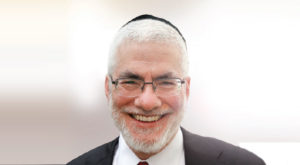Inbox: Issue 863

"If you’re in a position to have a not-yet-frum Shabbos guest or two for a Shabbos or Yom Tov meal, just do it"
How to React? [From Gaza with Hate / Issue 862]
Thank you for Gedalia Guttentag’s excellent — and terrifying — exploration of the anti-Semitism that has metastasized as Israel defended itself from an onslaught of Hamas’s rockets. He skillfully described the violent assaults and horrifying shouts of mobs, the vile hate and threats spreading across social media.
And then there is the less blatant, but no less frightening, anti-Semitism found in New York Times op-eds and AP articles, in the hundreds of accompanying comments vilifying Israel, and in tweets and quotes from your average young, woke professional too genteel to engage in blatant profanity or hate, but whose one-sided condemnation of Israel is no less frightening. Jews being blamed, investigated, condemned for actions like no other country ever has been? Stop this story now; we’ve heard it before and we know how it ends.
Seeing this hatred, I’m not sure how to react. My gut reaction is to do something: Tweet! Write an op-ed! Call out in self-defense! But is anyone listening? Does anyone care? And is this what we’re meant to be doing? Maybe I’ve just forgotten — or am lucky and young enough not to have experienced much of — Eisav sonei l’Yaakov. Maybe I should be taking more of a historical perspective, realizing that this is only the latest iteration of the hate that has stalked us for thousands of years. As a wise friend told me, “We’re pretty spoiled these days in our expectations of the non-Jews — not only shouldn’t they kill us, put us in ghettos, tax us into poverty, or draft our sons into their armies, we also want them to say nice things about us?”
Still, the feeling of that tightening vise is hard to ignore. “I came to American in 1949,” my grandmother told me last week. “And I can’t remember any time when the anti-Semitism was so bad.”
Rivka Baum
The Fine Line [Aftershocks in Karlin / Issue 962]
I want to acknowledge the coverage of the Stoliner beis medrash tragedy in view of the fact that the writer, Yochanan Donn, is a Stoliner chassid. He walked the fine line between professional journalist and empathetic friend with grace and skill, making it personal, painful, and real, without any hyperbole. It was impressive and I’m sure it was not easy for him.
May he and all your writers cover only happy occasions.
Hershel Perl
How Long Would He Last? [A Torah Heart / Issue 862]
Thank you so much for the beautifully written, heartwarming article about my good friend from Baltimore, Rabbi Yitzchak Lowenbraun ztz”l. “Itchie” was all heart, and an amazing friend. I loved his cute, “scratchy” nickname, which I had never heard before I met him. I also loved him as a person, and a close partner — he chose me many times as the NCSY advisor to help him coordinate his amazing shabbaton experiences. What a pleasure that was, because he was such an easygoing regional director to work with.
As a matter of fact, I was at Itchie’s first event, a weeklong summer seminar at Camp Louise, somewhere in Maryland, in August 1973, if I remember correctly. I came early to kasher the kitchen, and I saw this red-bearded fellow, rather out-of-place then in NCSY. As a seasoned NCSY advisor, I took one look and thought, “I wonder how long he’s going to last.” Thankfully, I was so wrong. His natural warmth and ahavas Yisrael helped so many turn on and tune in to Yiddishkeit, and his geshmak Bobover background added so much to his “toolbox” for kiruv.
(As far as I was concerned, his Bovover background was a big plus. Our Friedman family contact with the Bobover chassidus goes back to the 1940s, when my grandfather, Dr. Samuel “Shabbos” Friedman z”l, the first shomer Shabbos doctor in the US, helped bring the Rebbe ztz”l over via the Vaad Hatzalah, and helped him get settled on the West Side of Manhattan. Dr. Friedman stayed involved with Bobov for many years, and after his passing, other family members carried on the tradition — even until recently, a cousin from the Five Towns, Dr. Richie Friedman z”l, was the Rebbe shlita’s doctor.)
Itchie, thank you so much for those two memorable visits to my classroom, once with your Rebbetzin a”h, and once with yblch”t your son. And yes, thank you also for the Waffle Bar lunch and the new hat from Ferster. And, finally, for that beautiful last sheva brachos you hosted for my wife and me in Baltimore, in January 1977.
Chaval al d’avdin. Yehi zichro baruch.
With so many fond memories,
Rabbi Isamar Friedman
Neve Yaakov, Yerushalayim
At Least They’re There [Inbox / Issue 862]
R. Schachnow’s advice to familiarize oneself with all aspects of being menachem avel is excellent. In particular, this comment hit home: “a shivah visit is not about me.... it’s about the aveilim, and so often, the most important thing is just to be there so they see that you care.”
While we were collectively mourning the victims of the Meron disaster, just days later, on Rosh Chodesh, I personally experienced that crushing grief when my dear mother passed away.
I was with her when her soul returned to her Creator, but because I now live overseas, I couldn’t get home for the abbreviated shivah, cut short by Shavuos. I ended up sitting shivah on my own in my daughter’s home, in a city where I don’t really know anyone.
My children made sure the word got out, together with my contact information. Yet not one of my former neighbors nor most of my friends from shul or the neighborhood bothered to contact me. We had shared good times and bad for 30 years. They knew my mother; she used to say how nice they were to her when she visited, and how warmly they greeted her at our simchahs. I wonder what she’d think now.
I think R. Schachnow understated how important it is that the community, especially friends, are there for the avel. While people are often uncomfortable in the presence of aveilim, at least they are there. If visitors blurt out strange, even tactless remarks, they are there. They care.
Sitting shivah for my mother, I found out who cared enough — and who didn’t — and I was left even more distressed when I realized most of the people I had called my friends for over 30 years were, in fact, not the people I thought they were.
I got up from shivah just before Yom Tov, feeling hollow and alone. Yes, my husband was with me, my daughter and her family couldn’t have done any more to support me, but I really missed that connection that comes from hearing words of comfort from old friends.
Are we so desensitized to loss that we don’t have the emotional capacity to reach out at times of sorrow? What has happened to us? Have the mega-losses from corona stopped people responding at yet another death? Or in my situation, is it a case of out of sight, out of mind?
I guess I’ll never know.
Grieving back home
Open Your Home [Inbox / 862]
Letter writer Nina Litvak’s query to Mishpacha readers, “How often do you invite your not-yet-religious Jewish neighbors, relatives, and coworkers to your Shabbos and holiday tables?” should be a wake-up call to every frum Jew.
Indeed, how many of us do so even once a year? Or, for that matter, ever? We should — almost every one of us — stand shamefaced and klap al-cheit before this baalas teshuvah.
There are valid reasons why many cannot host not-yet-observant Jews at their Shabbos tables. But for most of us — perhaps the large majority — who can indeed have their fellow Jews over for Shabbos meals, Ms. Litvak’s letter is a timely reminder.
As for those who say they don’t know how to do outreach, not to worry. You don’t have to do anything special. Just interest yourself in your guests and do what you normally do every Shabbos. Because along with the multitudes of benefits Hashem gave us with Shabbos is the joyous one of being able to share our Shabbos table.
Imagine the profound impact on a Jew who does not yet observe Shabbos when he is with a frum family at the Friday evening Shabbos seudah: The family seated around the festive table in their finery, the Shabbos lights flickering over the gleaming table, the father blessing the children, the family joyously singing the zemiros, the children discussing the parshas hashavuah, the warm weekly Shabbos family togetherness experience . . . .
Imagine what goes through their minds, especially when they compare this traditional family Shabbos meal with their own family members’ diverse weekday Friday evening activities at the time!
It is fair to say that Shabbos has brought far, far more Jews to Jewish observance than all the rabbis, kiruv professionals, and kiruv organizations combined. Just ask any of the dozens of Jerusalem families who regularly hosted nonobservant Jewish students at their Shabbos tables who were sent to them by the late, great oheiv Yisrael Rav Meir Schuster. We were fortunate enough to be one of those families.
So, if you’re in a position to have a not-yet-frum Shabbos guest or two for a Shabbos or Yom Tov meal, just do it. Your ahavas Yisrael will open up your fellow Jews to the beauty of our Jewish way of living and help transform them. Perhaps no less important, in sharing your Shabbos table with others, I assure you that your own Shabbos will be enhanced and transformed by your chesed.
Michael Kaufman, Jerusalem
Keys to Our Continuity [Blurred Image / Double Take — Issue 861]
I found last week’s Double Take story so disturbing and I’m sure I’m not the only one.
I’m not a rebbi, nor am I the wife or mother of a rebbi. Rather, I’m a mother of a large number of boys — and so the profession as a whole carries a very, very sacred place in my heart.
I don’t believe it was a coincidence that in the very same publication as the Double Take, you featured a “Business Casual” column where experts provided a host of suggestions to motivate employees. There was one underlying theme to all those suggestions: Pay well!
Their tips include statements like “As a business owner, your staff is one of your biggest assets,” “Pay competitive salaries,” “Reward them with a bonus,” “Invest in your staff” — just to name a few.
Now try plugging that perspective into the framework of our schools, where our mission statement is slightly different but that much more important: to raise true bnei Torah and pass on our mesorah.
How can we accomplish that in the most optimal and impactful way? Well, ask the business experts. Our school’s staff, our precious rebbeim, are our biggest assets. They should not have to worry about how to pay their bills, they should not have to look for extra income, they should not have to receive vouchers and coupons for clothing and shoes.
The fact that both articles were featured in the same week is no coincidence but rather a powerful message. Mothers and fathers, I beg of you, open your eyes — understand how critical this is for our children. Let’s bring dignity and respect back to the profession of being a rebbi.
My husband and I are both professionals and we have made it our top priority to financially compensate our children’s rebbeim and always express our deepest gratitude. Not in hopes of better treatment for our sons, rather in recognition of the low salaries they receive and in an effort to provide them with the ability to teach our children with menuchas hanefesh.
To be a rebbi (or a morah for that matter) should be a highly coveted position that provides competitive pay and demands above industry standards. Too many top candidates are either leaving the profession or quitting because they can’t support their families.
Start with fundraising for their salaries before investing in anything else. Stop the vouchers and the food and clothing drives before Pesach, and give the rebbeim a salary that gives them the dignity they deserve, along with the ability to buy and pay for the things they need on their terms. As the CEOs describe, you will see an overhauled chinuch system.
I’m well aware that these ideas sound lofty. But we can fight for change. In the meantime, to every dear rebbi and teacher: Please know how much we value your efforts, hard work, and nonstop devotion. You are the key to our mesorah — and in turn our legacies. Thank you from the bottom of our hearts.
A mother of many boys (and lucky beneficiary of dozens of rebbeim’s hard work and efforts)
Completely Unfathomable [Baby Steps Diary Serial]
A while back, Mrs. Friedman wrote in her Screenshot column about Mishpacha being a balance of mirrors and windows — some material mirroring our day-to-day lives, and other material giving us a window into other experiences — and I often think about the material I’m reading and enjoying through this lens.
I wasn’t sure what to expect from the diary serial “Baby Steps,” but I read everything in the Mix, especially serials, so I jumped right in. At first glance, I thought it would be a saga about a couple’s journey with infertility, but by the third chapter it became clear that this was a story about financial planning and saving, and I’m really enjoying it. That said, I do finish each chapter with a slight sense of unease, as I wonder: Is this a mirror or a window?
On paper, the series sounds like a classic “mirror” — which middle-class family in 2021 can’t relate to the reality of juggling the ongoing expenses of daily life in a sustainable way? But if I’m painfully honest with myself, I have to admit that this particular story is really more of a window into the life of people who are really serious about their financial responsibility, and consistently committed to their goal.
Everyone I know pays lip service to this value, but no one I know will actually endeavor to make a Shabbos for guests without buying a single extra ingredient (or risk their social status by serving meatballs on Friday night and mushroom-barley soup on Shabbos day!). No one I know will actually agree to a ten-dollar discretionary allowance for herself in the name of this goal. (Only three specialty coffees a month? What happened to self-care?)
And I wonder — why? I don’t live in a luxury neighborhood, or associate with particularly upper-class peers (quite the contrary). Why is the accepted norm in most mainstream frum communities such that any one of David Ramsey’s baby steps is completely unfathomable to most of us?
I don’t have the answers. But the questions echo in my mind as I eagerly await to peek into Helen’s window next week.
Chani Waxman
P.S. I really hope they’ll have a baby!
(Originally featured in Mishpacha, Issue 863)
Oops! We could not locate your form.








